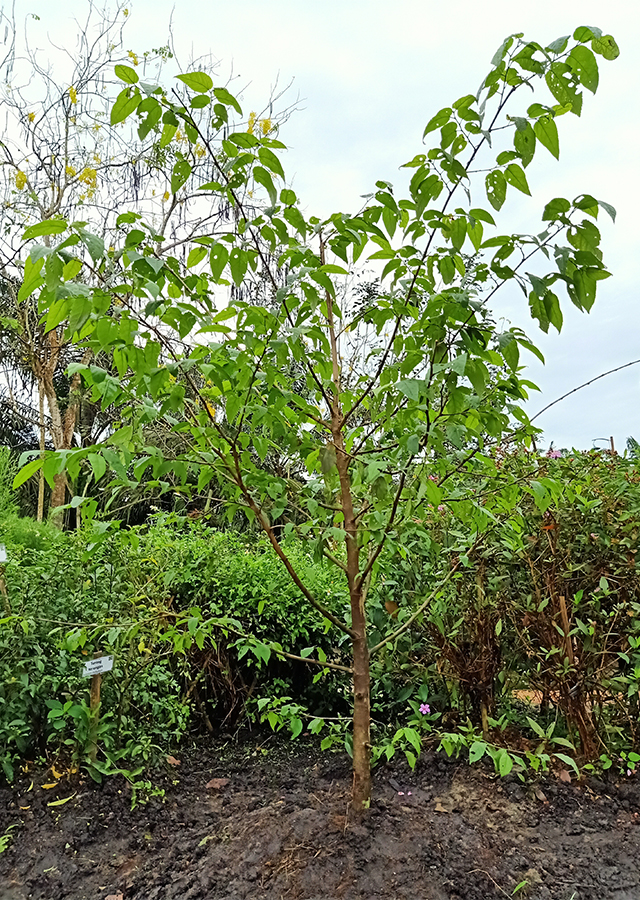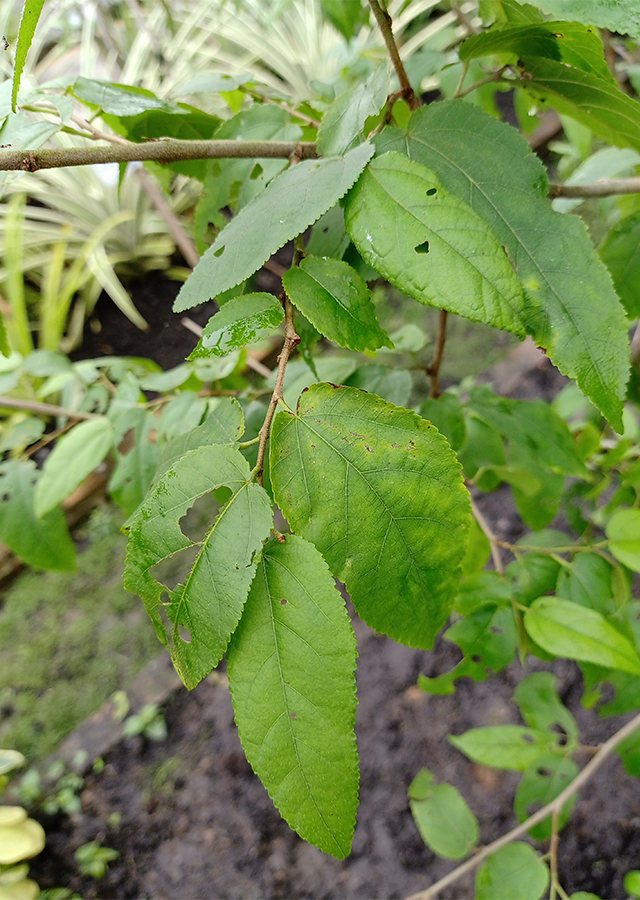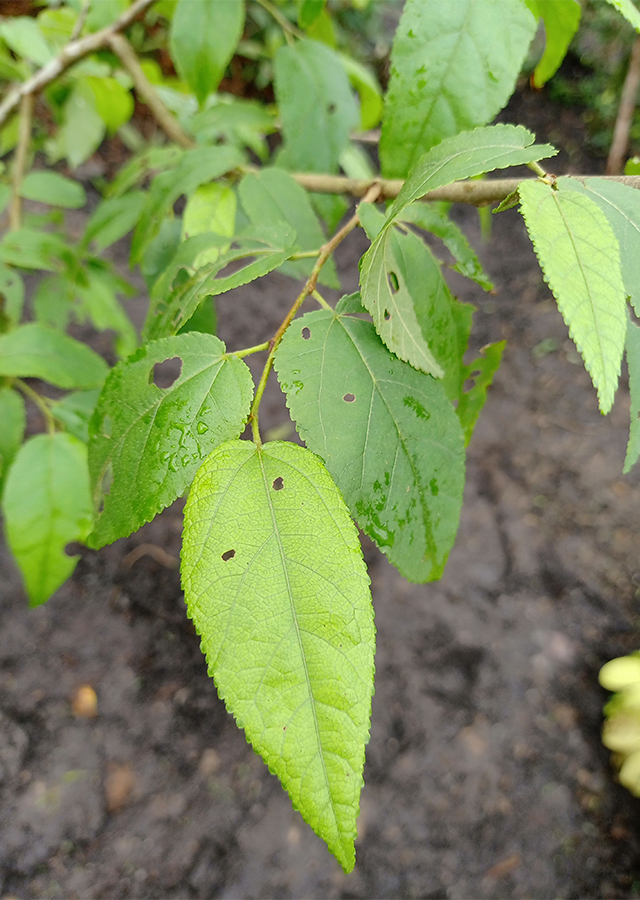Traditional Herbs from Guazuma ulmifolia
dysentery
- Prepare enough Dutch teak leaves then wash them until clean.
- Boil the leaves until they boil.
- Let them sit until warm/cold.
- Strain and drink.
wounds":[ "Take enough Dutch teak leaves and wash them until clean.
reduce_blood_fat
- Take 7 shoots to under\u00a0Dutch teak leaves.
- Boil with 3 glasses of water until it boils and reduces to 2 glasses of water.
- Drink 2 times a day (1 glass each).
body_slimming
- Use\u00a0 \u00b1 200 g dry powder of Dutch teak leaves.
- Brew it with 1 glass of hot boiled water, after it has cooled, strain it.
- Drink 2 times a day in the morning and afternoon.\u00a0
What is Guazuma ulmifolia Looks like??



Parts of Guazuma ulmifolia that could be used
- Leaves
- Seeds
- Bark
Guazuma ulmifolia Distribution
Dutch teak plants originate from South America, Brazil, Paraguay and Bolivia, north throughout South America and Central America to Mexico. Dutch teak has a long history of herbal use, and is widely used in modern herbal medicine in South America. In Indonesia, this plant is used as a slimming tea mixture. The bark is used to treat pneumonia and hemorrhoids. Leaf extract can be used to help treat dysentery and heal wounds. And the seeds are used to treat constipation. This plant is widely cultivated in India and Sri Lanka, and is often planted as a shade tree and ornamental plant.Agroecology of Guazuma ulmifolia
Dutch teak plants thrive at an altitude of 1 - 1,200 m above sea level. Grows best in areas where annual daytime temperatures are in the range of 22 - 32 °C, likes average annual rainfall in the range of 700 - 1,500 mm, prefers sunny positions. This plant is adapted to be found growing in alluvial and clay soils. Succeeds in a variety of soils but most commonly where the pH is higher than 5.5 . Prefers pH in the range of 6 - 7, tolerates 5 - 7.5.
Morphology of Guazuma ulmifolia
- The taproot is white-brown.
- The stem is hard, round, has a rough surface, many grooves, woody, branched and whitish green.
- Leaves are oval to broadly ovate, 4-16 cm long, with a pointed tip , the base is rounded to heart-shaped, and the edges are scalloped.
- Flowers are small, yellowish green or whitish, have a sweet aroma, and are found in the axils of the leaves.
- Fruit is hard, capsule, almost round or oval, diameter 2-3.5 cm, immature fruit is green and black when ripe.
- Seeds are small, hard, 2.5 mm in diameter, brownish.
Cultivation of Guazuma ulmifolia
- Generative propagation using seeds. Propagation by seeds requires scarification before planting. Pour boiling water over the seeds, leave for 30 seconds, then drain. With fresh seeds, germination occurs in 7 - 14 days at a rate of 60 - 80%. Seedlings are ready planted after reaching a height of 30 - 40 cm (around 15 weeks). This plant can also be planted by direct seeding.
- Vegetative propagation with stem cuttings.
Guazuma ulmifolia, more details :
Chemical Content of Guazuma ulmifoliaAlkaloids, terpenoids, saponins and steroids, acids (tartaric, caurenoic, asparaginic), flavonoids (kaempferol, procyanidin B2, procyanidine B5, procyanidine C1), gums (xanthan gum), purines (theobromine, caffeine), tannins (catechins, colatannins ), octacosanol, friedelin- 3a, 3ß-ol, ß-sitosterol, friedelin, farnesol, taraxerol, colestin.
Benefits of Guazuma ulmifolia
Helps cure malaria, skin diseases (leprosy, acne, boils), syphilis, wounds, elephantiasis, chest diseases, bronchitis, diarrhea, dysentery, colds, coughs, bruises, topical medicine for hair loss and baldness, cures uterine fibroids, lose weight (slimming tea mixture), pneumonia, hemorrhoids, alopecia, fever, asthma, constipation, infections, bleeding, type 2 diabetes, acts as a diuretic.
Simplisia of Guazuma ulmifolia
- Prepare enough Dutch teak leaves then wash them with clean water, then drain them so that the remaining washing water is wasted.
- Chop them to a width of 1.5 cm so that drying takes place more quickly.
- Dry them by airing them in a place protected from sunlight.
- Blend the dry leaves until they become powder then sift them with a 60 mesh sieve.
- Store in a clean, airtight container.
Another Facts for Guazuma ulmifolia :
Synonym of Guazuma ulmifoliaBubroma guasuma Willd.Bubroma polybotryum (Cav.) Willd.Guazuma blumei G.Don
Habitus of Guazuma ulmifolia
Tree. Annual tree, 10-30 m high
Habitat of Guazuma ulmifolia
- Riverside", "Forest", "Land
No comments:
Post a Comment